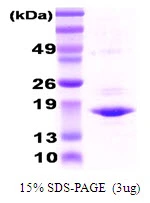
3μg Human alpha A Crystallin protein (GTX67320-pro) by SDS-PAGE under reducing condition and visualized by coomassie blue stain.
Human alpha A Crystallin protein
GTX67320-PRO
Protein IDP02489
Product group Proteins / Signaling Molecules
Overview
- SupplierGeneTex
- Product NameHuman alpha A Crystallin protein
- Delivery Days Customer9
- CertificationResearch Use Only
- Concentration1 mg/ml
- ConjugateUnconjugated
- Gene ID1409
- Target nameCRYAA
- Target descriptioncrystallin alpha A
- Target synonymsCRYA1, CTRCT9, HSPB4, alpha-crystallin A chain, crystallin, alpha-1, heat shock protein beta-4, heat shock protein family B member 4, human alphaA-crystallin (CRYA1)
- Protein IDP02489
- Protein NameAlpha-crystallin A chain
- Scientific DescriptionMammalian lens crystallins are divided into alpha, beta, and gamma families. Alpha crystallins are composed of two gene products: alpha-A and alpha-B, for acidic and basic, respectively. Alpha crystallins can be induced by heat shock and are members of the small heat shock protein (HSP20) family. They act as molecular chaperones although they do not renature proteins and release them in the fashion of a true chaperone; instead they hold them in large soluble aggregates. Post-translational modifications decrease the ability to chaperone. These heterogeneous aggregates consist of 30-40 subunits; the alpha-A and alpha-B subunits have a 3:1 ratio, respectively. Two additional functions of alpha crystallins are an autokinase activity and participation in the intracellular architecture. The encoded protein has been identified as a moonlighting protein based on its ability to perform mechanistically distinct functions. Alpha-A and alpha-B gene products are differentially expressed; alpha-A is preferentially restricted to the lens and alpha-B is expressed widely in many tissues and organs. Defects in this gene cause autosomal dominant congenital cataract (ADCC). [provided by RefSeq, Jan 2014]
- Storage Instruction-20°C or -80°C,2°C to 8°C
- UNSPSC41116100
- SpeciesHuman
